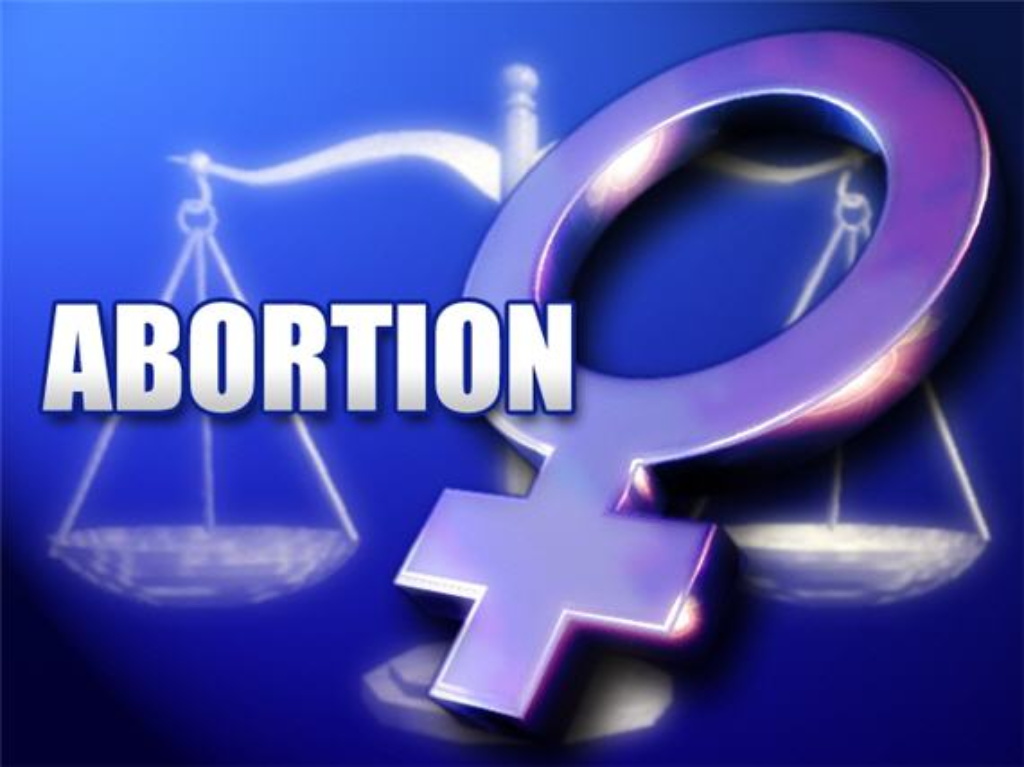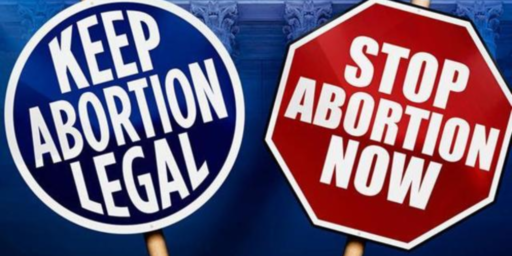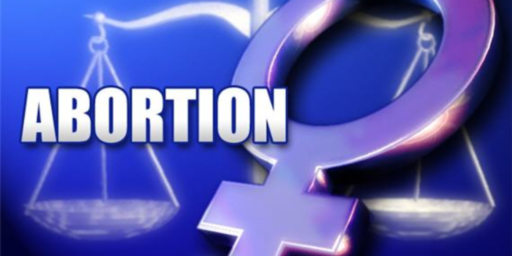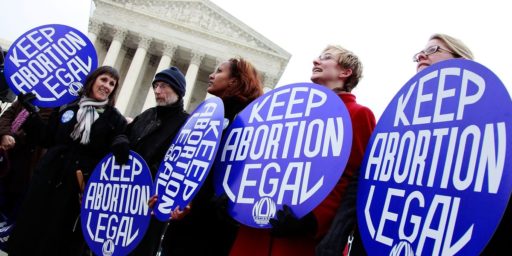Another Poll Shows Increased Public Support For Abortion Rights
Increased focus on conservative efforts to overturn Roe v. Wade appears to be rallying public support for abortion rights.

Another new poll shows support for abortion rights hitting new highs even as states controlled by Republicans continue their efforts to craft laws to restrict those rights and pass laws meant to serve as a direct legal challenge to the Supreme Court’s precedents on the matter:
Support for legal abortion stands at its highest level in more than two decades according to a Washington Post-ABC News poll, even as numerous states adopt restrictions that challenge the breadth of rights established by the Supreme Court’s 1973 Roe v. Wade decision.
The Post-ABC poll finds a 60 percent majority who say abortion should be legal in most or all cases, up from 55 percent in a 2013 Post-ABC poll, and tying the record high level of support from 1995. The latest survey finds 36 percent say abortion should be illegal in all or most cases, also tying a record low.
In 2013, a Post-ABC poll found 55 percent of Americans said abortion should be legal in all or most cases. The increase in support for legal abortion has increased in part because of large growth in support among independent women voters (up 16 points to 71 percent) and Democrats (up 12 points to 77 percent).
A 41 percent plurality of Americans want their own states to avoid making it either harder or easier for women to have access to abortion. Fewer (32 percent) say their states should make it easier and fewer still (24 percent) say their states should make it harder for women to have access to abortion.
Many states have recently passed laws to limit abortion, and some, such as Georgia, have tried to effectively ban it. Many of these restrictions are being challenged and could eventually wind up before the Supreme Court.
Most Americans have circumstantial views of abortion laws — a majority say that abortion should be either legal in most cases (33 percent) or illegal in most cases (22 percent). About 4 in 10 say it should always be legal or illegal, with roughly twice as many who say abortion should be legal in all cases (27 percent) as say it should be illegal (14 percent).
Even within party ranks, allowing or banning abortion in all cases is a minority position. Among Democrats, 77 percent say abortion should be at least mostly legal, but just over 4 in 10 (42 percent) say it should be legal in all cases. Among Republicans, 52 percent say it should be at least mostly illegal, but fewer than a quarter, 22 percent, want it to be illegal in all cases.
(…)
Looking ahead to 2020, just over 6 in 10 Americans say abortion is either “one of the single most important issues” in their vote or a “very important issue.” Democrats are more likely than Republicans to say that abortion is an important issue in their vote for president, 71 percent vs. 57 percent. The gender gap on abortion’s importance is nearly twice as large: 73 percent of women say abortion is important to their 2020 vote compared with 46 percent of men.
Asked about President Trump’s handling of the abortion issue, disapproval outpaces approval by 54 percent to 32 percent margin. A majority of Republicans (65 percent) approve of Trump’s efforts on the issue, but that lags his 87 percent overall job rating among fellow partisans. Meanwhile, 85 percent of Democrats disapprove, as do 53 percent of independents.
Opinions on abortion do not differ greatly among people living in states with more or less restrictive laws. In the 30 states where abortion is prohibited at 24 weeks or earlier (except in cases of life or health endangerment), a 57 percent majority say abortion should be legal in all or most cases. And residents of the remaining states with fewer restrictions on abortion are slightly more likely to say abortion should be legal (64 percent).
These poll numbers are consistent with other recent polling on the abortion issue that has taken place in the wake of the new spate of state laws aimed at denying access to abortions in almost all cases. For example, a recent poll conducted by Reuters and IPSOS which showed majority support for abortion rights in most or all circumstances, It’s also consistent with a recent NBC News/Wall Street Journal poll showing that support for abortion rights at a new high as well as a poll by Quinnipiac University which finds that 65% of Americans support keeping Roe as it is, while just 27% support overturning it. Not surprisingly, these polls also show that, at least in the early stages of pregnancy Americans support the right of women to choose to have an abortion. Another recent poll that showed that most Americans, including a plurality of Republicans, oppose overturning Roe and its progeny. It is also consistent with other polling conducted before the Kennedy retirement and Kavanaugh’s confirmation and the latest spate of new state-based abortion laws:
- A poll from the Kaiser Family Foundation, for example, found that 67% of Americans opposed overturning Roe while only 29% supported overturning it.
- Similarly, a Quinnipiac University poll found that 63% of those surveyed opposed overturning the decision while only 31% supporting overturning it.
- A Gallup poll found that 64% of those surveyed said that they opposed overturning the decision, while just 28% said they supported overturning it.
- Finally, a poll from NBC News and The Wall Street Journal found that 71% of those surveyed favored keeping the precedent in place while only 23% favor overturning it.
All of these polls show that most Americans would prefer the Roe precedent stay in place.
Polls like these are important because of the implications they have for the 2020 elections. While Republican opposition to abortion exists largely to please the religious groups that are part of the GOP coalition, most specifically the Evangelical Christians, the poll numbers showing that even a large segment of the group of people that consider themselves Republican don’t want to see Roe overturned and support the right to choose at least to some extent are significant because they show that the GOP base isn’t as united on this issue at it appears..
Furthermore, opposition to overturning Roe and support for abortion rights generally is very high among women, among younger voters, and among those not aligned with any political party but who sometimes lean Republican is fairly high. These are groups among whom the GOP is already in trouble electorally. Seeing the party tied to these new highly restrictive laws and a strategy that seems aimed not at adopting a law that will actually go into effect but in plotting a strategy to overturn Roe could cause them to abandon the GOP at an even faster rate than they already are. This is why you’ve seen many top Republicans distancing themselves from this new slate of anti-abortion laws; because they are afraid of the political implications of being tied to an effort to restrict abortion rights. It also explains why many opponents of abortion have sought to discourage other states from following in the footsteps of those that have passed extremist anti-abortion law. The more this issue is at the forefront in 2020, the more it’s likely to motivate voters already inclined to oppose Trump and the GOP.




Well, isn’t this standard? No one worries about the potential overturning of a law until it looks like the powers-the-be are actually looking like they can do it.
No one appreciates a right until it looks like said right is about to vanish…..
It’s virtue signaling. When you’re not worried that your wife or daughter or self will be unable to get an abortion you can earn cheap virtue points by mooing about unborn babies.
But we don’t do things in this country on the basis of national majorities. The Supreme Court seems inclined these days to give more control of policy back to the individual states. State-by-state polls would be much more informative about what would happen if Roe v. Wade were overturned. Particularly if we keep in mind that in most states, the structure of the legislature pretty much guarantees that the legislators will average older, richer, and more conservative than their constituencies.